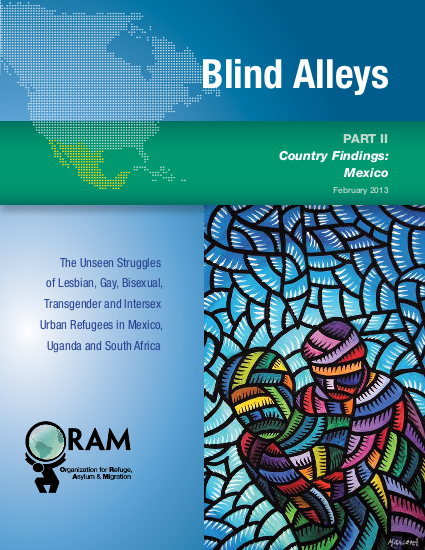
In Latin America, Mexico’s laws are among the most protective of SGN16 people, particularly in Mexico City. This progressive trend in legislation is unfortunately not supported by adequate enforcement and does not necessarily translate to better conditions for SGN refugees. Protection gaps undermine the ability of SGN refugees to access rights and services to which they are entitled and impact their survival in Mexican society. To better understand these challenges and develop effective solutions, ORAM – Organization for Refuge, Asylum & Migration conducted a series of interviews with SGN refugees, NGO staff, and other stakeholders.
In the interviews, SGN refugees reported mixed experiences with the Mexican authorities. Many refugees described their interactions with state agents positively, but also recounted discrimination that they often simply normalized. Some recounted extortion or attempted extortion by the police, which they perceived as a fact of life. One NGO interviewee suggested that despite the positive legal environment, “[Mexicans] are accustomed to the idea that lesbians and gays have no rights.” SGN refugees can be severely harmed by police inaction, particularly in detention. Refugees reported being beaten by other detainees with no reaction from guards.
The SGN refugees interviewed experienced abuse not only by criminal gangs, but also at the hands of other migrants. The most serious non-state actor abuses in Mexico were attacks along migratory routes by criminal gangs and other migrants. Many of the interviewees traveled alone or with other SGN migrants, thus heightening their vulnerability. Consistent with the interviewees’ reports, stakeholders identified transgender women as being particularly vulnerable. While many of the interviewed SGN refugees reported that their environment in Mexico was an improvement over their countries of origin, many still expressed feelings of isolation and a lack of community in Mexico. Discrimination in the job market against sexual minorities remains an obstacle for SGN refugees, and can serve either as a barrier to hiring or as a reason for dismissal. As a result, SGN refugees suffer from lack of employment opportunities, though most interviewed had obtained at least part-time legitimate work.
While these interviews reveal many problems faced by SGN refugees in Mexico, they also provide guidance on how protection of this vulnerable population can be improved. To this end, ORAM has developed a detailed set of recommendations aimed at improving the quality of services intended for SGN refugees and closing the existing protection gaps, as presented in Part II of this report.
Resource collections
- Accountability to affected populations (AAP)
- UN Habitat - Urban Response Collection
- Urban Response - Urban Crisis Preparedness and Risk Reduction
- Urban Response Collection - Community Engagement and Social Cohesion
- Urban Response Collection - Economic Recovery
- Urban Response Collection - Environment and Climate Change
- Urban Response Collection - Housing, Land and Property
- Urban Response Collection - Urban Crisis Response, Recovery and Reconstruction
- Urban Response Collection - Urban Resilience